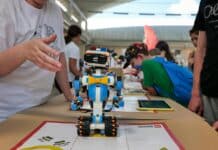In traditional classrooms, students often passively absorb information from textbooks and lectures, leading to disengagement and limited practical application of knowledge. However, an alternative approach called project-based learning (PBL) is gaining recognition for its ability to foster deep understanding, critical thinking, and collaboration skills.
This article explores the advantages of project-based learning and how it can transform education.
Meaningful Learning
Project-based learning allows students to tackle real-world problems or explore authentic topics of interest. By engaging in hands-on projects, students connect academic content to practical applications, making learning more meaningful and relevant. This approach promotes a deeper understanding of concepts as students construct knowledge and develop problem-solving skills. The smartest students outsource a portion of their take-home writing assignments to expert writing services online, i.e., they can buy essay UK online instead of dying over every paper during sleepless nights.
Active Engagement
PBL shifts the role of students from passive recipients to active participants. Students become creators, researchers, and collaborators in their learning journey. They take ownership of their projects, setting goals, making decisions, and managing their time. This active engagement boosts motivation, curiosity, and a sense of agency, leading to more excellent investment in learning outcomes.
Critical Thinking and Problem-Solving
Project-based learning nurtures critical thinking and problem-solving skills. Through open-ended projects, students encounter complex challenges that require analysis, synthesis, and evaluation. They learn to identify problems, develop strategies, gather information, and apply creative solutions. This process encourages independent thinking, innovation, and resilience in the face of obstacles.
Collaboration and Communication
PBL provides opportunities for collaborative learning, reflecting the collaborative nature of real-world work environments. Students collaborate with peers, engaging in discussions, sharing ideas, and working towards common goals. They develop effective communication skills, such as presenting findings, listening actively, and providing constructive feedback. Collaborative projects foster teamwork, empathy, and respect for diverse perspectives.
Skills for the Future
Project-based learning equips students with essential skills for the future. In addition to subject-specific knowledge, they develop transferable skills like critical thinking, creativity, communication, collaboration, and adaptability. These skills are highly valued in the modern workforce, where problem-solving and teamwork are essential for success.
Authentic Assessment
PBL offers alternative forms of assessment beyond traditional tests and exams. Students’ progress and achievements are evaluated through project outcomes, presentations, reflections, and demonstrations of their learning. This authentic assessment allows students to showcase their skills and knowledge in meaningful contexts, providing a more comprehensive understanding of their abilities.
Enhanced Creativity and Innovation
PBL encourages students to think creatively and innovatively. Engaging in open-ended projects allows them to explore different perspectives, experiment with ideas, and take risks. This freedom fosters creativity, as students are encouraged to find unique solutions and think outside the box. PBL promotes innovation by allowing students to develop original ideas and apply their learning in novel ways.
The Key Takeaway
Project-based learning is a powerful approach that transforms education by promoting meaningful learning, active engagement, critical thinking, collaboration, and essential future skills. Through hands-on projects, students develop a deeper understanding of content, apply knowledge to real-world contexts, and develop important life skills. By embracing project-based learning, educators can create dynamic and empowering learning environments that prepare students for success in an ever-changing world.





